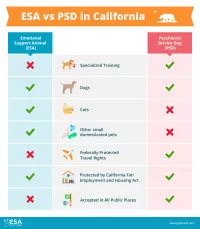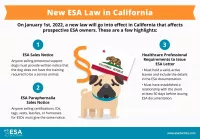
As a resident of the Golden State, your emotional support animal (ESA) is protected under federal and state laws if you have a valid ESA letter. California has a special set of laws when it comes to emotional support animals that are different from the rest of the country.
That’s why we created this guide, written and fact-checked by our team of ESA legal experts, to help you navigate the rules surrounding emotional support animals in California.
In California, the way to prove that you have an emotional support animal is by showing your landlord a signed ESA letter from a licensed healthcare professional.
A licensed professional can be a doctor, therapist, counselor, psychiatrist, psychologist, or social worker. Under CA Health & Safety Code §122318, the healthcare professional must:
A key requirement in California law is the 30-day waiting period. If you are obtaining an ESA letter for the first time, you must have established a relationship with the provider at least 30 days beforehand.
California’s Health & Safety Code §122317 aims to ensure residents are aware of the differences between emotional support animals and psychiatric service dogs.
Note that you do not need to buy an animal that is somehow specifically meant to be an ESA. Emotional support animals also do not require any specialized training.
Your existing cat, dog, bird, fish, or other pet may already function as your emotional support animal. Most domesticated pets can qualify as ESAs, as long as they provide relief for your mental health condition.
There is no documentation needed for a service dog in California, although psychiatric service dog handlers will obtain PSD letters. PSD letters are not subject to a 30-day waiting period.

Share this image on your site Copy
California residents can live in no-pet buildings with their emotional support animals, free of charge. ESA owners are also exempt from breed, size, and weight restrictions.
That’s because the California Fair Employment and Housing Act prohibits landlords from discriminating against people with disabilities who need an emotional support animal.
The term “disability” has a distinct meaning under the Americans with Disabilities Act, Fair Housing Act, and California Housing Act. A “disability” can be a mental impairment that “substantially limits one or more major life activities.”
A “mental impairment” can include conditions like depression, severe anxiety, PTSD, ADHD, phobias, or bipolar disorder. If you’re wondering whether you meet that standard, it’s best to consult with a therapist or doctor.

Landlords can deny a tenant’s request to live with an emotional support animal if the animal “constitutes a direct threat to the health or safety of others (i.e., a significant risk of bodily harm) or would cause substantial physical damage to the property of others.” The housing provider’s finding has to rely on objective evidence about the animal’s actual conduct.
The housing provider cannot say that an ESA is a danger based on old, unreliable evidence, mere speculation, or fear about the types of harm or damage an animal may cause. For example, a landlord can’t reject an ESA solely because they have preconceived notions about the animal’s breed.
It’s important to note that even if a housing provider makes this finding, they must still determine whether the harm can be sufficiently mitigated or eliminated by reasonable accommodation.
That means the landlord should work with you to address any concerns about your ESA before they move to take drastic action.
Landlords in California can never require a tenant with an ESA to pay a pet fee, additional rent, additional security deposit, or liability insurance because they have an emotional support animal.
ESA owners, however, are always responsible for the cost of repairs for damages their ESA causes to the premises, excluding ordinary wear and tear.
You are allowed to have multiple ESAs under both federal and California rules. Each emotional support animal must be covered by the ESA letter from a licensed healthcare professional. When faced with a tenant requesting accommodation for more than one ESA, landlords can consider “whether the cumulative impact of multiple animals in the same dwelling constitutes an undue burden or fundamental alteration.”
What restrictions can my landlord place on my emotional support animal in California?Landlords in California are allowed to impose reasonable conditions on owners of emotional support animals to ensure they are under the tenant’s control. Reasonable conditions include things like restrictions on waste disposal and animal behavior that may constitute a nuisance, as long as the conditions do not interfere with the normal performance of the ESA’s duties.
Do you need a vest, ID card, or certificate for an emotional support animal in California?Accessories like vests, identification cards, and ESA certification do not prove that you have an emotional support animal in California. To qualify for an ESA in California, you need an ESA letter from a licensed healthcare professional.
Where can I take my emotional support animal in California?Emotional support animals in California have the right to live in your home. They do not have the right to access public areas that ban pets, such as stores, restaurants, and school campuses. ESAs are protected under federal and state housing laws but not the Americans with Disabilities Act (ADA).
The ADA protects service animals, such as psychiatric service dogs, that are trained to perform tasks to help their owner’s disability. PSDs have public access rights and can accompany their owners in stores, restaurants, and other public places.
Rental buildings are subject to ESA rules in California. ESA housing rules apply to rentals, condos, and HOAs. Therefore, most landlords have to comply with Fair Housing rules. A few smaller landlords are exempt.
For example, if your landlord is a single-family home that was rented by the owner without the use of a real estate agent or you live in a 4-unit dwelling where the owner lives on the premises, the landlord may not have to comply. However, many landlords will still accommodate an ESA as a courtesy.
California labor laws are more accommodating of emotional support animals than other states. In California, certain employees may have the right to bring an ESA to work. If you’re interested in bringing an ESA to your workplace, it’s a good idea to speak to your HR department to understand the process for your workplace.
Some workplaces happily accommodate ESAs and have policies and guidelines for doing so.
It’s always a good idea to disclose that you have an emotional support animal, especially if you live in a building that bans pets. You are allowed to inform the landlord before or after signing the lease. Consider, however, whether your relationship with the landlord might be hurt if you disclose your ESA afterward.
If you don’t tell your landlord about your ESA and your building doesn’t allow animals, you may be in violation of your lease. Your landlord would then have the right to fine you, evict your ESA, or worse. That’s why it’s better to be open and honest about your emotional support animal.
As long as you have your California ESA letter, you are protected against housing discrimination. If your landlord does deny your ESA, they must have a valid exemption and engage in a dialogue with you to work through any issues they raise.
Landlords that fail to comply with ESA laws can get in serious trouble. Landlords have been fined and sued by the government for not accommodating tenants with assistance animals.
If I already have an ESA letter, but I’m moving to California, do I need a new one?If you already have an ESA letter, but not from California, and you are moving to the Golden State, it might be a good idea to get a new ESA letter. Some landlords will accept out-of-state ESA letters from new tenants.
However, many landlords will insist on an ESA letter from someone licensed in California. That is especially true if your letter is outdated. In any case, it’s a good idea to establish a relationship with someone in California who can help you with your mental health and ESA needs.
The new ESA laws in California had one primary goal: to deter the spread of fake emotional support animals and service dogs. If you want to qualify for an ESA in California, you need to find a healthcare professional or service that is reputable and understands the new rules.
If you need an ESA and don’t want to conduct in-person visits, there is no better option than ESA Doctors. They are one of the oldest and most highly rated services available online; thousands of California residents trust them.
ESA Doctors will connect you to an independent remote healthcare professional licensed for California. They understand ESA rules — including the latest developments — and will get you an ESA letter that actually works. If you need a PSD letter, they have you covered as well.

About the Author:
The ESA Doctors writing team has extensive experience relating to disability and housing laws, mental health, animal training, and pet health. Each article is fact checked and reviewed by multiple members of our team. Many of the writers have emotional support animals and speak from real life experiences.
Get pet tips (like this post) + exclusive discounts every month!
We promise to never spam you.